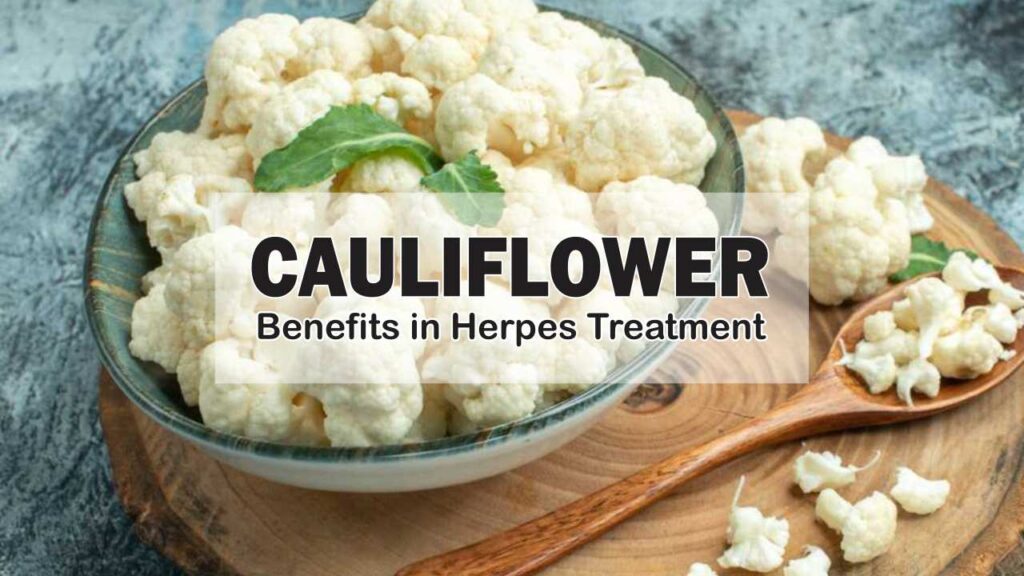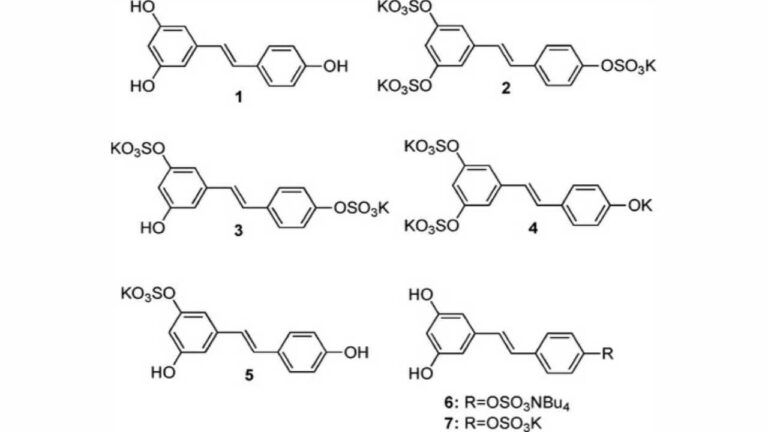Cauliflower, scientifically known as Brassica oleracea var. botrytis, is a cruciferous vegetable that has gained popularity due to its culinary versatility and numerous health benefits, including in herpes treatment.
In addition to being an excellent source of vitamins, minerals, and fiber, cauliflower also possesses medicinal properties that can aid in the treatment of herpes.

Benefits of cauliflower in herpes treatment
Antiviral
Cauliflower has antiviral properties that can help combat the herpes simplex virus. Some studies indicate that certain compounds present in cauliflower, such as sulforaphane, can inhibit viral replication, thereby reducing the severity and frequency of herpes outbreaks.
Immunostimulant
Cauliflower is rich in nutrients such as vitamin C and zinc, which have immunostimulant properties. These nutrients help strengthen the immune system, which plays a crucial role in the response to the herpes simplex virus. A healthy immune system can help prevent new infections and reduce the severity of herpes outbreaks.
Anti-inflammatory
Herpes often causes inflammation in the affected areas. Cauliflower contains anti-inflammatory compounds such as indoles and isothiocyanates, which can help reduce inflammation and alleviate symptoms associated with herpes sores.
Wound healing
Cauliflower is rich in nutrients such as vitamin C, vitamin A, and beta-carotene, which are essential for skin health and aid in the wound healing process. These nutrients promote cell regeneration, speeding up the recovery of wounds caused by herpes.
Reduction of oxidative stress
Oxidative stress, caused by an imbalance between free radicals and antioxidants in the body, can worsen herpes symptoms. Cauliflower is an excellent source of antioxidants such as vitamin C, vitamin E, and flavonoids, which help neutralize free radicals and reduce oxidative stress, providing relief from symptoms.
Amino acid balance
Cauliflower has a good proportion of amino acids, such as lysine and arginine. Lysine is known to inhibit the replication of the herpes simplex virus, while arginine can stimulate it. Consuming foods rich in lysine, such as cauliflower, can help balance these amino acids and inhibit viral activity of herpes.
Detoxification
Cauliflower contains sulfur compounds such as sulforaphane and indole-3-carbinol, which aid in detoxifying the body. These compounds stimulate liver enzymes, helping to eliminate toxins and harmful waste. Proper detoxification can support overall body health, including the fight against herpes.
It is important to note that cauliflower should not replace conventional medical treatment for herpes, but it can be an important ally in strengthening the immune system and beneficial for herpes treatment.
Main Nutrients in Cauliflower and Their Benefits for Treating Herpes
Lysine
Cauliflower is an excellent source of lysine, an essential amino acid that plays an important role in combating herpes. Lysine is known to inhibit the replication of the herpes simplex virus, which can help reduce the frequency and severity of herpes outbreaks. Additionally, lysine can contribute to the prevention of new infections by helping to strengthen the immune system.
Vitamin C
Cauliflower is a good source of vitamin C, a powerful antioxidant that plays a vital role in immune system health. Vitamin C strengthens the body’s defenses, aiding in protection against viral infections, including herpes. Additionally, vitamin C is also important for skin and mucous membrane health, contributing to faster healing of herpes lesions.
Beta-carotene
Cauliflower contains beta-carotene, a plant pigment that is converted to vitamin A in the body. Vitamin A is essential for skin and mucous membrane health, making it important in the treatment of herpes. Additionally, beta-carotene has antioxidant properties, helping to combat the damage caused by free radicals and reduce inflammation associated with herpes lesions.
Fiber
Cauliflower is a good source of dietary fiber, which is beneficial for the digestive system and may play a role in herpes treatment. Fiber helps promote proper intestinal function, aiding in the adequate elimination of toxins from the body. A healthy digestive system contributes to a strengthened immune system, assisting in the fight against herpes.
Antioxidants
In addition to vitamin C and beta-carotene, cauliflower contains a variety of antioxidants that can be beneficial in herpes treatment. These antioxidants, such as vitamin E and flavonoids, help protect cells against oxidative damage caused by free radicals. They also aid in reducing inflammation and strengthening the immune system, contributing to a more effective response against the herpes virus.
Minerals
Cauliflower is a good source of essential minerals such as zinc and selenium, which play an important role in proper immune function. These minerals have antiviral properties and can help strengthen the body’s defenses against viral infections, including herpes. Additionally, zinc is involved in the healing process and may contribute to faster recovery of herpes lesions.
How to Incorporate Cauliflower into a Herpes Treatment Diet
When incorporating cauliflower into a diet focused on herpes treatment, there are various preparation methods that can be explored. Here are some suggestions on how to use cauliflower in your diet:
Raw consumption
You can add raw cauliflower to salads. Cut it into small florets and mix with other fresh vegetables and leafy greens. This will preserve its nutrients and provide a crunchy texture.
Steam cooking
Steaming cauliflower is a great option to maintain its nutrients intact. Cut it into smaller pieces and steam for about 5 to 7 minutes until it becomes tender but still slightly crisp. Season with a little salt and pepper before serving.
Sautéing
Another option is to sauté cauliflower in a skillet. Heat a little olive oil over medium-high heat, add the cauliflower cut into smaller pieces, and sauté for a few minutes until it becomes golden. Season with your favorite herbs and spices to add extra flavor.
Roasting in the oven
Cauliflower can also be roasted in the oven. Cut it into florets and spread them on a baking sheet. Drizzle with olive oil, season with salt, pepper, and other spices of your preference, such as garlic powder, cumin, or paprika. Roast in a preheated oven at 200°C (400°F) for about 20 to 25 minutes until it becomes tender and lightly golden.
Cauliflower mash
You can prepare cauliflower mash as a healthy alternative to mashed potatoes. Steam the cauliflower until tender and then mash or process it until it reaches a mashed potato-like consistency. Add a little butter, plant-based milk, or broth for creaminess. Season with salt, pepper, and your choice of spices.
Ingredient substitution
Cauliflower can also be used as a substitute in recipes that traditionally use heavier carbohydrates. For example, you can make a cauliflower-based pizza, replace rice with cauliflower “rice,” or make cauliflower “risotto.” These substitutions can help reduce the carbohydrate load in the diet, which can be beneficial for some individuals with herpes.
Remember that the diet should be balanced and include a variety of healthy foods in addition to cauliflower.
Summary
Cauliflower can be a beneficial addition to a diet focused on herpes treatment. Its antiviral, immune-boosting, anti-inflammatory, and wound healing properties can help reduce the severity and frequency of herpes outbreaks.
You can incorporate cauliflower into your diet by consuming it raw in salads, steaming it, sautéing it, roasting it in the oven, making a mash, or substituting it in traditional recipes. It’s important to remember that cauliflower does not replace proper medical treatment, and consulting a healthcare professional is essential for a comprehensive and personalized treatment plan.




